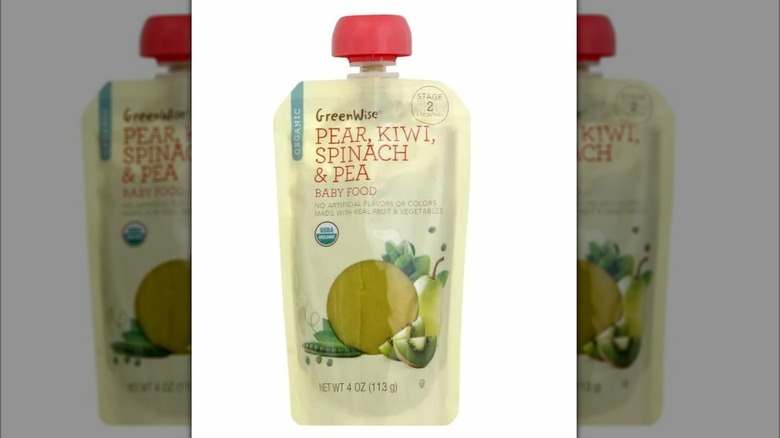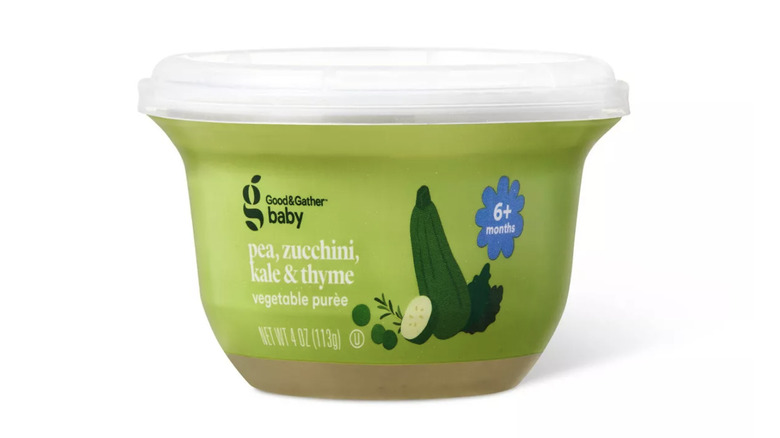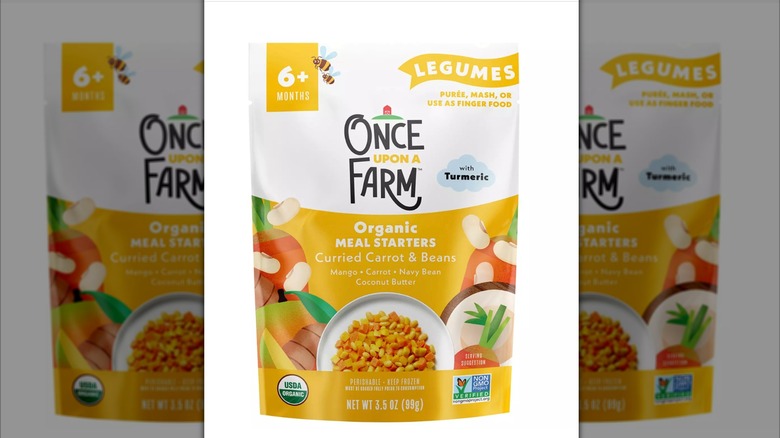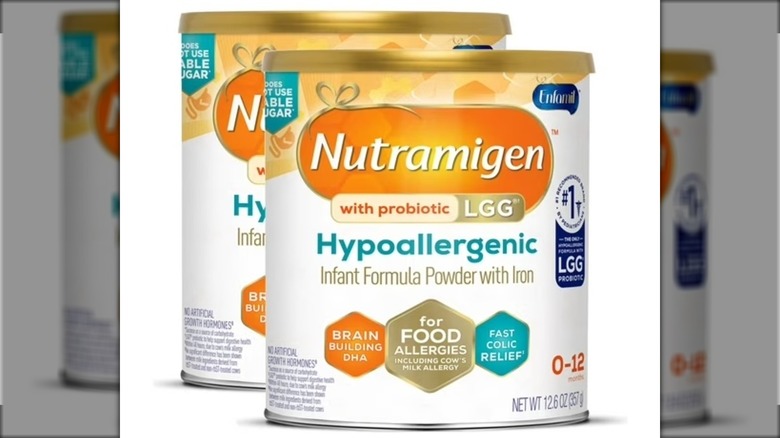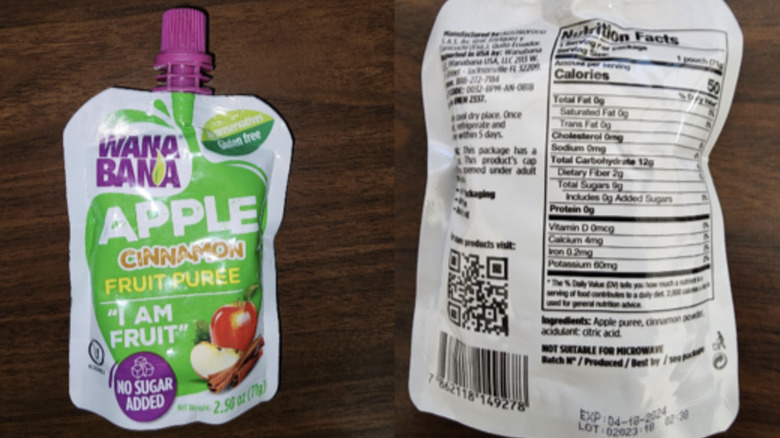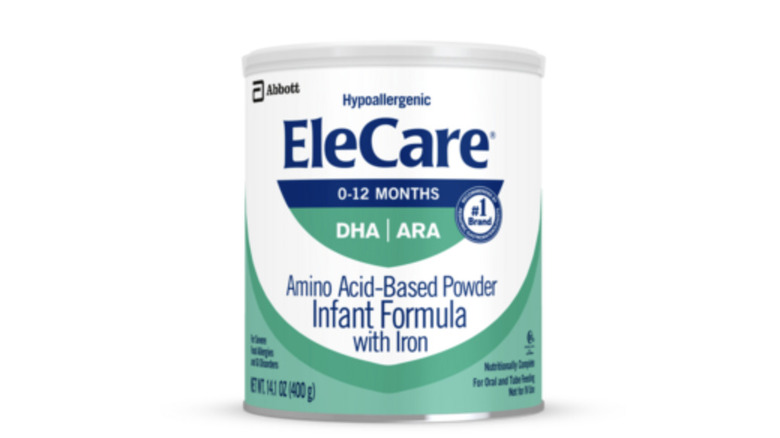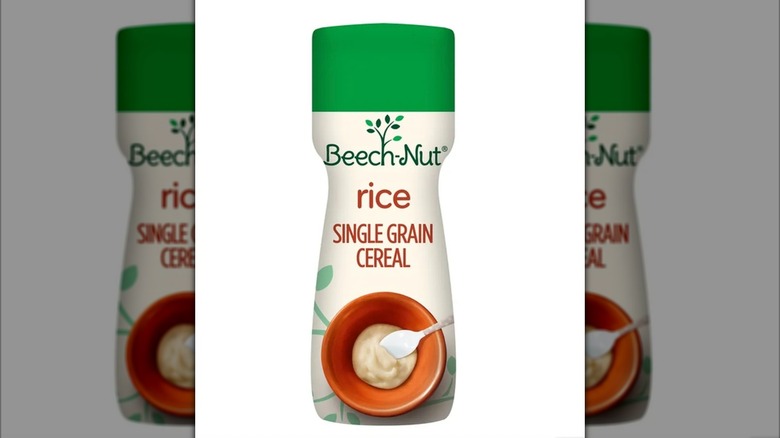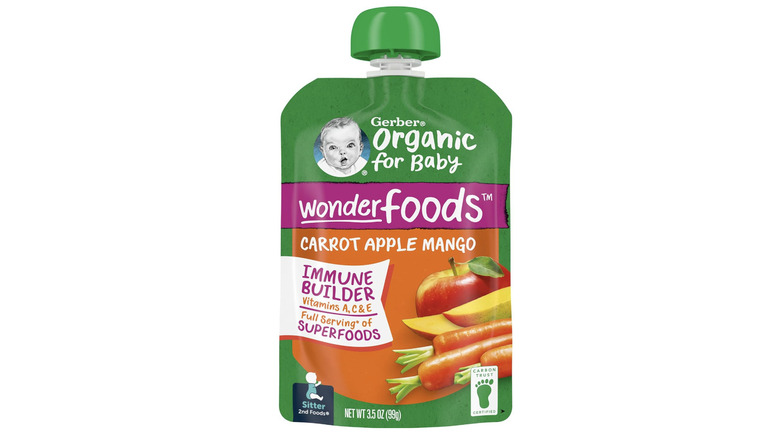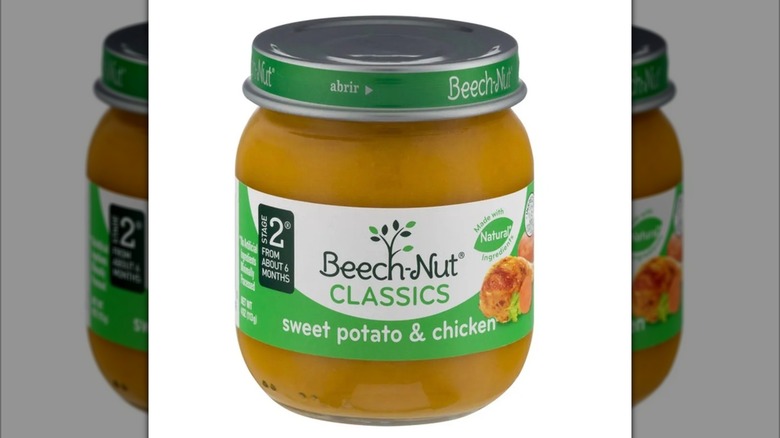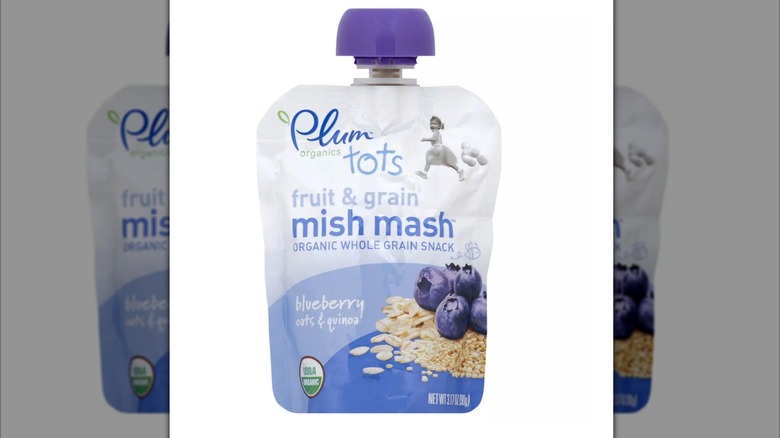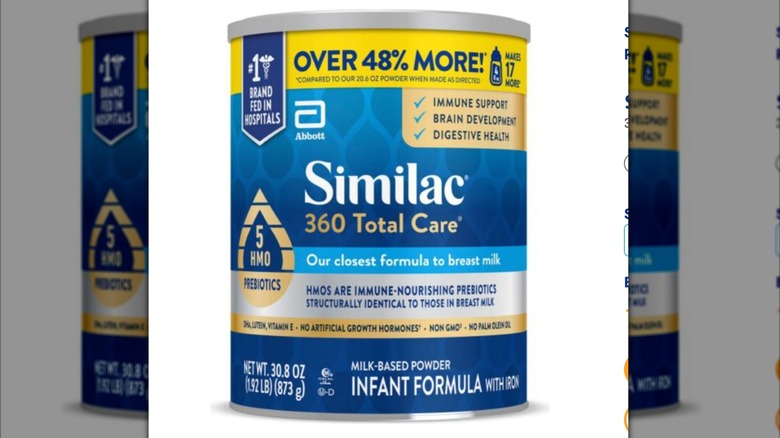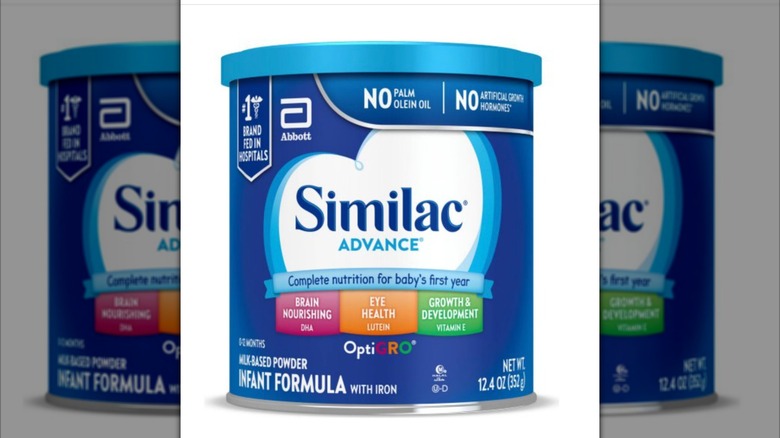Baby Food Recalls That Affected Millions
We may receive a commission on purchases made from links.
Oversights that lead to product recalls can have serious consequences, from triggering allergic reactions and foodborne illnesses to causing long-term medical complications and even death. Sometimes, we tend to forget that such mistakes don't just affect adults, but also endanger the health of children — including babies.
Baby food recalls can happen for various reasons, including contamination, packaging defects that can lead to spoilage, and elevated levels of heavy metals such as lead and arsenic. Regardless of the reason a certain baby food is removed from store shelves, these types of recalls are particularly troubling as young consumers are more likely to experience severe health effects than adults. Given that even trace amounts of harmful substances can have a devastating effect on the health of babies, it's unsettling to see how many baby food recalls have taken place over the years. Here's a look at some of the most significant baby food recalls that have affected millions of consumers.
Publix recalled GreenWise Pear, Kiwi, Spinach & Pea Baby Food due to potential lead contamination (2025)
Founded in 1930, Publix has grown from having one location in Winter Haven, Florida, to boasting more than 1,400 locations across eight states. In May 2025, the company hit the spotlight in all the wrong ways when it voluntarily recalled GreenWise Pear, Kiwi, Spinach & Pea Baby Food, which had been sold in its grocery stores. The affected states included Alabama, Florida, Georgia, Kentucky, North Carolina, South Carolina, Tennessee, and Virginia.
The baby food, which was manufactured by Bowman Andros Products, LLC, was pulled off the shelves after it was discovered that it may contain elevated lead levels. The issue came to light during a routine inspection, which found that some pouches contained lead levels of 13.4 parts per billion, higher than the limit of 10 parts per billion recommended by the FDA. Exposure to lead can have severe consequences, particularly for young consumers. More specifically, babies exposed to the heavy metal may suffer developmental delays and health complications.
Fruselva USA recalled Target's Good & Gather Pea, Zucchini, Kale & Thyme Vegetable Purée due to elevated lead levels (2025)
Good & Gather is one of Target's best-selling brands featuring approximately 2,000 different products, including granola bars, sparkling water, pastas, and baby food. While Target claims that its Good & Gather products undergo strict quality and flavor testing, the recent recall of one of the brand's packaged meals has raised questions about the company's safety protocols.
Fruselva — the manufacturer of Target's Good & Gather Pea, Zucchini, Kale & Thyme Vegetable Purée — recalled the product in March 2025 due to concerns over high lead levels. The affected product came packaged in 4-ounce tubs formulated for babies over 6 months of age. In total, Fruselva USA ended up recalling 25,600 units of the baby food, which had been distributed nationwide. Notably, just months before this recall, the USDA initiated new guidelines to minimize lead levels in baby food.
The FDA gave the recall of Target's Good & Gather Pea, Zucchini, Kale & Thyme Vegetable Purée a Class II designation, indicating cases where the use or consumption of a tainted product may cause a short-term or reversible health condition, with only minimal risk of serious harm. While no deaths have been linked to the Good & Gather Pea, Zucchini, Kale & Thyme Vegetable Purée, two babies in Oregon became sick with lead poisoning after eating the product.
Once Upon a Farm recalled organic curried carrots and beans due to potential contamination with listeria monocytogenes (2024)
Curried veggies for babies are a far cry from your typical Indian butter chicken or Trinidadian curry mango. Instead of fiery and complex spices, curried baby food normally utilizes very mild and simple seasoning that's easy on delicate digestive systems. Once Upon a Farm's Organic Plant‑Rich Meal, Curried Carrots & Beans, is one such product. Unfortunately, 2024 saw the company pull the product from supermarket shelves due to possible contamination with listeria monocytogenes. The frozen baby food was sold in Alabama, Florida, Georgia, Kentucky, Louisiana, New Jersey, North Carolina, South Carolina, Tennessee, and Texas.
Listeria monocytogenes is particularly dangerous for babies and young children, which made this recall very serious. Some of the symptoms of this bacterial infection include nausea, vomiting, diarrhea, and fever. Sadly, more acute cases can lead to balance problems, convulsions, and even death.
Reckitt/Mead Johnson Nutrition recalled Nutramigen Hypoallergenic Infant Formula Powder due to possible contamination with Cronobacter sakazakii (2023)
In 2023, Reckitt/Mead Johnson issued a safety alert after discovering that its Nutramigen Hypoallergenic Infant Formula Powder could be contaminated with Cronobacter sakazakii. The formula had been specifically developed for infants allergic to cow milk. The alarm was raised after the Israeli Ministry of Health notified the FDA that the product tested positive for a Cronobacter species at the border during routine testing.
The infant formula had been manufactured at the Mead Johnson Nutrition Zeeland facility in Michigan and exported to several countries, including Argentina, Canada, Dominican Republic, Ecuador, El Salvador, Guatemala, Mexico, Poland, Spain, and the United Kingdom. In total, Reckitt/Mead Johnson Nutrition recalled 675,030 cans of the formula.
Cronobacter sakazakii is a rare but potentially dangerous bacteria naturally found in the environment. Unfortunately, the pathogen can also contaminate food, including infant formula. Cronobacter sakazakii can lead to life-threatening conditions such as meningitis and sepsis, as well as bowel damage.
WanaBana recalled Apple Cinnamon Fruit Purée Pouches due to high levels of lead (2023)
In 2023, WanaBana issued a recall of its Apple Cinnamon Fruit Purée Pouches after testing revealed that some units of the product contained lead levels above those recommended by the FDA. The 2.5-ounce pouches of the purée were sold nationwide both at retail stores and on online platforms like the Dollar Tree and Amazon. The apple cinnamon fruit purée was also sold under the brand names Schnucks and Weis, with both products similarly pulled from supermarket shelves.
The apple cinnamon fruit purée pouches ended up sickening more than 50 children. The affected children were all under four years of age and came from 25 states. This isn't surprising, given that the baby food contained 2.18 parts per million of lead, substantially higher than the FDA's recommended limit of 10 parts per billion for fruit, vegetables, yogurts, custards, and pudding.
Abbott Nutrition recalled powdered infant formula after an outbreak of Cronobacter sakazakii (2022)
Abbott Nutrition's recall of powdered infant formula under the brand names Similac, Alimentum, and EleCare was particularly tragic because it was tied to four illnesses, including two fatalities. More specifically, the formula, which had been distributed across the U.S. and internationally, may have been contaminated with Cronobacter sakazakii.
The Cronobacter sakazakii pathogen was detected in environmental samples taken at Abbott's facility in Sturgis, Michigan. While the bacteria was not found in any of the tested products, its presence in the production environment raised concerns about cross-contamination. Abbott underscored its commitment to safety standards at the time of the recall, saying, "Abbott conducts extensive quality checks on each completed batch of infant formula, including microbiological analysis prior to release. All finished products are tested for Cronobacter sakazakii, Salmonella newport and other pathogens and they must test negative before any product is released."
Beech-Nut Nutrition recalled Beech-Nut Single Grain Rice Cereal due to overly high arsenic levels (2021)
Trace amounts of arsenic are naturally occurring in the environment. Given that the heavy metal can be found in both water and soil, it doesn't come as a surprise that minuscule amounts of arsenic can also be found in food. Nevertheless, there is a good reason why food safety agencies set limits on arsenic in consumables at a safe threshold. Excessive arsenic exposure can lead to symptoms such as nausea, vomiting, and the sensation of numbness or burning in the hands and feet.
In 2021, Beech-Nut Nutrition issued a recall of its rice baby cereal after testing by the State of Alaska revealed that the product contained levels of arsenic that exceeded the advised maximum for naturally occurring inorganic arsenic.The recall of Beech-Nut Rice Single Grain Baby Cereal prompted Beech-Nut Nutrition to discontinue the production of rice baby cereal. Although the flour used to manufacture the product met the acceptable inorganic arsenic limit, the company cited concerns about sourcing rice flour that fell below the FDA's arsenic guidance level. Luckily, no adverse health effects were linked to the baby cereal at the time of the recall.
Gerber recalled organic baby food pouches due to packaging defect (2016)
From mislabeling to leaks and breaks, packaging defects are among the most common reasons for food recalls. While this may seem like a small issue, any damage to the packaging can lead to spoilage during shipping and handling. A suspected manufacturing defect is precisely what prompted Gerber to recall its baby food pouches in 2016. The affected products included 3.5-ounce pouches of Gerber Organic Pears, Carrots & Peas and Gerber Organic Carrots, Apples and Mangoes.
Gerber recalled the baby food pouches when three consumers reported that their babies suffered short-term gastrointestinal problems after eating the product. While the baby food could not be definitively linked to the health issues, the company decided to recall the products as a preventative measure. "As a result you may notice that, in some cases, those pouches are bloated or [the] product inside may have an off-taste or odor. We are proactively working to retrieve all remaining pouches of the affected batches that fail to meet our quality standards," Gerber President and Chief Executive Gary Tickle said in a statement reported by CNN at the time.
Beech‑Nut Nutrition recalled baby food due to possible contamination with glass (2015)
Beech‑Nut Nutrition has been producing baby food since 1931. Today, the company prides itself on delivering flavorful food for babies and toddlers that has been tested for as many as 255 contaminants, such as pesticides, toxins, and heavy metals. Given this focus on rigorous testing, it may come as a surprise that in 2015, the company recalled its 4-ounce glass jars of Stage 2 Beech-Nut Classics sweet potato & chicken over concerns that it was contaminated with glass.
Beech‑Nut ended up recalling approximately 1,920 pounds of the baby food after a consumer reported finding a shard of glass in the product. In fact, the company received a complaint about an oral injury suffered by a young consumer while eating the product. It's unclear whether these are the same or different cases. The Beech-Nut Classics baby food had been distributed for sale at retailers throughout the country. Given the seriousness of the incident, the FDA assigned the recall a Class I designation, pertaining to cases where there is a reasonable chance that eating the tainted product could result in severe health effects or even death.
Plum Organics recalled baby food pouches due to manufacturing defect (2013)
Founded in 2007 by a group of parents, Plum Organics focuses on organic, nutritious foods and snacks for children. Plum Organics was acquired by the Campbell Soup Company in 2013, just months before it announced the recall of one of its baby food products. Interestingly, Campbell's divested the company to Sun-Maid Growers in 2021 to focus on its main production lines of soups, sauces, and beverages.
Campbell's, via Plum Organics, announced the recall of various Baby Stage 2, Tots Mish Mash, and Kids products on November 8, 2013. The pouches were pulled from grocery store shelves after the discovery of a packaging defect that could compromise the products, making them unsafe for consumption. The president and co-founder of Plum Organics, Neil Grimmer, addressed the recall in a statement at the time, saying, "As a father of two, I know how it feels to want nothing but the very best for our kids and yours. Over the years, Plum has worked hard to earn the trust of parents, and we fully intend on maintaining that trust. We are taking every action to ensure that our highest standards are being met" (via The Campbell's Company).
Abbott Laboratories recalled Similac powdered infant formula due to potential contamination with insects (2010)
Formulated to promote immune function, cognitive development, and gut health in babies, Similac powdered infant formula faced scrutiny in 2010 for a very unusual reason. Abbott Laboratories recalled nearly 5 million cans of the product after inspectors found beetles mixed into the powder. The little critters, and their larvae, were also discovered at the Michigan plant where the formula was manufactured.
Abbott Laboratories announced the recall after two consumers reported finding the common beetle in one of its products. While not deadly or even seriously hazardous, if consumed, the beetle could have irritated the digestive system and caused discomfort in infants. To remedy the situation, Abbott Laboratories stopped production while the Michigan plant was fumigated over a three day period. The 8-ounce, 12.4-ounce, and 12.9-ounce cans of Similac powdered infant formula had been distributed in the U.S., as well as Guam, Puerto Rico, and parts of the Caribbean.
Abbott Laboratories recalled Similac Advance infant formula with iron due to contamination with plastic fragments (2005)
Babies need sufficient iron for healthy growth and development. This is where products like the Similac Advance infant formula with iron can help, offering a way to provide balanced nutrition for babies that aren't exclusively breastfed. Unfortunately, in 2005, rather than delivering safe, reliable nourishment, the powdered baby formula was found to contain an unwanted — and very unexpected — ingredient: plastic fragments.
The Ross Products Division of Abbott Laboratories, which was responsible for producing the formula, recalled the product after discovering that some of the cans were contaminated with small black plastic particles. These 12.9-ounce cans of the product were sold mainly in the Eastern U.S. and in the states of Iowa, Kansas, and Missouri. The company explained that the plastic contamination was caused by a one-time manufacturing error, which had been quickly identified and resolved.

